International Day against Homophobia celebrated in Cuba -- three reports from Havana
Havana, 16 May, 2009 – Prensa Latina – International Day against Homophobia was observed here today, with the participation of a diverse, largely youthful public.
In the early hours of the morning, the day's activities began at the headquarters of the Union of Writers and Artists (UNEAC) and the Pabellón Cuba, in the central district of El Vedado.
Mariela Castro Espín, the director of the National Center of Sex Education (CENESEX), presided over the inauguration of the day's events with a parade and the opening of the panel on "Sexual diversity in the Cuban family."
On display at the UNEAC headquarters were the most recent issues of Sexología y Sociedad (Sexology and Society), the journal published by CENESEX and distributed at no cost through the network of libraries and universities of the country, in collaboration with the United Nations Population Fund. The journal covers subjects such as comprehensive services to and social inclusion of transsexuals in the island; sexuality as a social determinant of health; and violence against women.
Referring to the impacts on Cuba of the observances of International Day against Homophobia, Espín explained that research comparing the situations before and after the first observance in 2008 is being conducted.
Poet and essayist Miguel Barnet, the UNEAC president, said that, as the vanguard of society, writers and artists respect and support this scientific and educational program, led by Espín and her team. “This is a day against ignorant thought that prevents us from advancing, a task on which our artists cannot turn their backs. We must pay attention to the latest and most advanced thought'', Barnet said.
The gathering was attended by Cuban national literary award winners Nancy Morejón and Reynaldo González, as well as writers Senel Paz, Ana Lydia Vega, Leonardo Padura, and Lina de Feria, among others.
Talks, book sales, expositions, film showings, and concerts will be held throughout the day, which are all free and open to the public, and will end after midnight.
Alarcon: Cuba respects sexual diversity
Havana, May 17, 2009 – Prensa Latina – The president of the Cuban National Assembly (parliament), Ricardo Alarcon, said the essence of socialism is the inclusion rather than exclusion of people for their sexual orientation or religion.
Alarcon spoke with Prensa Latina, as Cuba observed International Day Against Homophobia.
"The Cuban drive against homophobia shows maturity and culture achieved by our society", the top Cuban legislator said.
International Day Against Homophobia was marked in Cuba on May 16 with a panel on sexual diversity, presentations of books and artistic shows. Mariela Castro Espin, head of the National Center for Sex Education (CENESEX), opened the forum at Havana's Pabellon Cuba.
Castro said such events are part of an education strategy, whose aim is to fight a reality that has been misunderstood out of ignorance.
["International Day against Homophobia in Cuba" is the translation by Yoshie Furuhashi of "En Cuba jornada por el Día Mundial contra la Homofobia" (Prensa Latina, May 16, 2009). "Alarcon: Cuba Respects Sexual Diversity" was first published by Prensa Latina on May 17, 2009.]
‘Homophobia is the problem, not gays'
By Irina Echarry, photos: Caridad
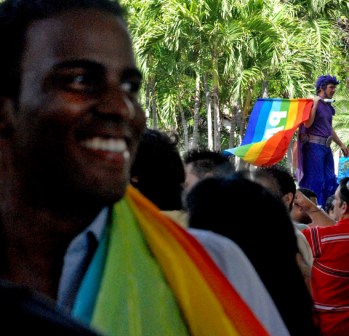
Homophobia is the problem
Havana Times, May 19, 2009 - Havana’s 23rd Street was a grand fiesta on Saturday, May 16, as people of all ages and sexual orientations formed a winding conga line that extended to Pavilion Cuba, the place where Sexual Diversity Day was formally initiated. Havana Times was on the scene to listen to speakers, capture photos, and talk with several participants.
In her opening words, Sexual Education Center (CENESEX) director Mariela Castro Espin noted, “This it is not a gay pride march, that’s not our intention at this time. In reality, we’re identifying with a proposal made by a French activist to designate a World Day against Homophobia. Gays are not a problem, the problem is homophobia!”
CENESEX, supported by other institutions across the country, encouraged discussion and reflection within families about sexual diversity, said Mariela. The aim was not to question the family structure that predominates in Cuban society, but to consider other forms, which people are less accustomed to, but are part of the country’s reality. Lesbians, gays, transsexuals and their families all had their chance to speak and exchange experiences – some bitter, others buoyant.
Thanks to educational campaigns such as this, the issue of homophobia is being addressed at some levels, though generally Cuban society continues to be homophobic.
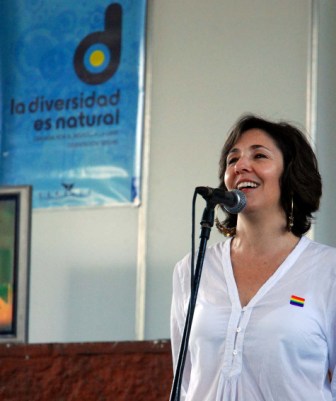
Mariela Castro Espin, director of CENESEX.
During the first years of the Cuban Revolution, homosexuality was harshly repressed. There are countless stories about incidents occurring in forced internment centres. Felix Luis Sierra’s book, El ciervo herido (The Wounded Deer), is only one example of the ordeal of someone who was in the Military Production Support Units: forced labour camps set up in the 1960s in Camagüey Province, where homosexuals and believers of different religions were taken, along with other “anti-social elements”. A harrowing book, the work reveals testimonies of intolerance and hatred.
That’s homophobia: a feeling that repels people from gays, who are viewed as a threat. Typically, Cuban society does not recognise homosexuals, and when it does, it is through usually negative stereotypes. Little tolerance is shown for erotic homosexual relationships, jokes are made in bad taste, and they are pointed out and accused of anything.
The cost of this disparity remains high in this 21st-century era of post-modernity. It continues to be paid when some intellectuals and artists undertake work aimed at introducing us to themes of sexual diversity, or as current fashions favor the influence of one sex over another in terms of styles of dress or hairstyles.
Discrimination continues
Day-to-day anecdotes are abundant, from people recounting stories about a group of women harassed by police at the beach, or nighttime soap operas that caricature gays, putting them on public display to be judged for their “immoral behaviour”. These shows imply that HIV is a punishment for being gay, as their poorly focused characters become recorded in the public’s minds.
Homophobia is not limited to one strata of society. There are professionals who hate homosexuals because they “go against nature”. These individuals recognise that gays are the same as other human beings, but also that they are “misguided”. So what’s to expect from people who are less educated?
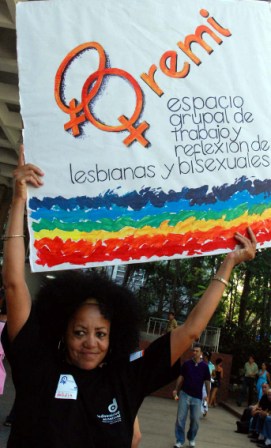
Oremi, a group space of work and reflection.
Where does a female teen go who begins to feel something strange for her female math teacher, despite knowing that this is “not normal”? What does a young gay or lesbian person do who hates military life and is surrounded by people who constantly humiliate them? Where does a person go who is kicked out of their house by their own family? There are many questions and few answers.
Many times people who feel attraction for their same sex repress their feelings so as not to be mistreated. Prisoners of fear, they are denied the right to love and be loved freely.
Jackeline is lesbian, though few people know it. She has not been very lucky in her love life, she is afraid of being ostracised. “My position is quite healthy with respect to others. I’ve tried to follow the canons that society imposes, to not complicate my life. Seeing the situations of my friends, I believe that it’s better like that way. I believe discrimination continues. It’s contradictory, but the more people learn that homosexuals are asking for social recognition, the more they reject them; it should be the other way around, but that’s how it is.
“I don’t want that to happen to me. Despite these campaigns, there’s no change taking place. I come here and see people applauding. I recognise myself in those who speak and say with pride that they’re gay or lesbian, but then I think it through, and I realise that this isn’t going to work. It’s going to be a long time before we see any progress.”
The lesbian group Fenix from Cienfuegos Province doesn’t think the same way. They have a place at what’s called the Health Palace in their city where they meet to give and receive seminars on the inclusion of homosexuals in the active life of society as they work to seek greater acceptance. Vivian and Miyita told Havana Times: “We’re doing a study on lesbophobia, which consists of socializing lesbians with the family, and vice versa. The objective of the initiative is to ensure that society understands that the woman has always been the matriarch of the family, whether or not she has children or is married or divorced.
“We see the woman as a primordial link in society, from the creative point of view, as a creator, incorporating society, independent of her sexual orientation. Our families have come all the way from Cienfuegos to give support today. In a past we had problems with heterosexuals, now there’s a bit more understanding. We are advancing little by little, step by step.”
Twenty-five years in an undesirable marriage
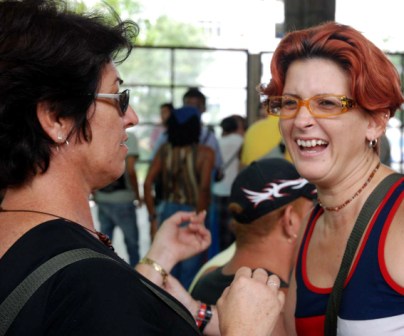
Amparo: ‘They forced me to marry when they saw something different in me.'
A moving testimony was given by Amparo, a resident from a town in Pinar del Río Province, who was obligated to marry a man she didn’t love. She was a member of the Catholic Church, almost the right hand of the town’s parish priest. She had had “that feeling” for a long time, but it was repressed by her parents, who were much older and did not understand anything.
“They forced me to marry when they saw something different in me. In a rural community, everything is more complicated. I was married for 25 years, and I suffered a great deal. The only good thing from that time are my two children. Then came a person who made me realise my sexual orientation; we fell in love and I decided to break with everything.
“My parents had already died. I understood that this was the moment to give myself a chance. At what other time was I going to do it? I had waited long enough. I thought about myself for the first time in my life, and I acted. I was ostracised by the church, but I knew that would happen. I dropped out on my own, I stopped going to communion. I believe in God; God is love, and I think that if I feel love for a person, even though they are of my same sex, then God is still there.''
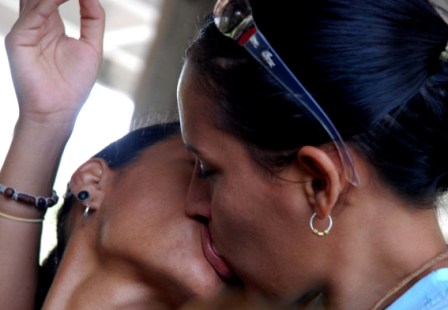
“But that goes against the commandments of the church, and people put us down a lot. They say it’s not right if a woman loves another woman, and she feels sexual desire for her. I advise all people who have that type of feeling in their heart that they not hesitate for anybody. Life is yours and there’s only one. There’s no reason to waste it for the sake of being accepted, people will always talk. I worried about my children a great deal, but they are wonderful, they’re mine.
“No one can take away my being a mother, on the contrary. My older child is now 24, and he is very loving with my current partner, he very respectful. My daughter is 13 and is my best friend. They accept me because I’m their mom. Like I say, when there’s love everything flows. They love me as a mother, as a woman, as Amparo.
“The sexual relationship is something that’s yours; you don’t have to share it with anybody. It’s like when somebody prefers a certain flavour of ice cream; why would you take the flavour that somebody else wants? I suffered a lot when I made my decision; I broke a lot of chains, but my children supported me, as did my partner back then. I finally overcame it all, and today I’m a happy woman. At my job I’ve been accepted as a human being, and that’s the fundamental thing.”
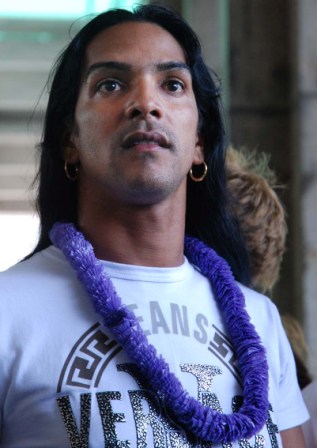
The life of homosexual people in Cuba is not rose-colored; they have to face prejudices, dogma, labels, hate and machismo.
Raydel, a 40-year-old professional, talked about his experience as a person who is gay: “I went to eat with my partner and we were stopped up by the police more than five times in less than 15 minutes, each asking us for our IDs. They dealt with us badly, even though we were not in a gay place or dressed in women’s clothes. They looked at us as if we were robbers or murder suspects.
“Bad behaviour exists among all social groups. Once I was held an entire night for riding on a bike with my partner. And then when you’re in jail they’ll accuse you of anything; they can say that you were in a park naked having sex openly with another person, or they’ll say that there is a law against you, against male prostitution. It’s your word against theirs. The police of the Ministry of the Interior do not wear badges, so you can’t identify them or accuse them. Without proof, you can’t do anything. When they want to, they can destroy you and screw up your life.”
Injustice goes unanswered
This information doesn’t come out in the press; there is no coverage about the injustices committed. It is difficult to sensitise a population that doesn’t know that these persons suffer or what they must endure. Gays are often rounded up; the truck arrives and takes them away even though they have not done anything. These are only stories that circulate by word of mouth and don’t make it to higher-ups, to people who could do something to improve the situation.
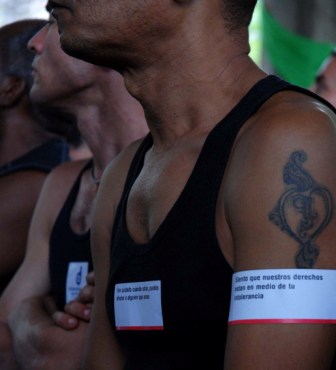
Be careful, when you hate you can hurt someone you love.
Homophobia among police, soldiers and officials is a thorny issue. Groups like CENESEX have been trying to sensitise them but it’s a difficult slow process. There is no stipulation in Cuban law against someone dressing in the clothes of another sex, nor is it illegal to express one’s homosexual orientation openly, the 1997 criminal code modified a previous article. What the police do stems from their own prejudices, from their macho perceptions that have failed to change.
In the ongoing “Diversity is Natural” campaign the focus is being placed on university students, those who will one day be able to change the thinking of society. The drive is also appealing to the family as the fundamental base for the creation of values, feelings and principles among the next generation.
According to Mariela Castro, “An effort is being made from the grassroots. You cannot go directly to the army and impose measures on those who are not prepared. If through educational campaigns it is possible to influence the family, subsequently soldiers, officials and police officers who are a part of Cuban life will also change, and they themselves will introduce transformations in military institutions.”
To affect change we must continue working for people’s mutual respect in all spaces. We must work for harmony between people, and especially not forget that there are human beings who discriminate and are discriminated against, those that humiliate and those humiliated. There are people who accept or don’t accept their neighbor. Homophobia is a wrong that can be eradicated, although it will take time, tenacity and persistence.
It is a complicated matter, but not impossible.
Mariela Castro says prejudices in Cuba delay law reform
Mariela Castro says prejudices in Cuba delay homosexual law reforms
12 January 2010
She says "prejudices" are the reason the parliament has not yet approved laws which would approve gender identity and homosexual union reform laws, changes promoted by her organisation (CENESEX) for many years.
"Prejudices are at the root of all the resistance, all prejudices .. related to the roles of women and men" said the sexologist and daughter of President Raul Castro.
CENESEX promotes a law of gender identity which can legally recognise trans-sexual change in gender without the need for surgery, and a reform to Family Law to create homosexual legal unions, a matter which has now been before the Cuban Parliament for more than two years.
Despite the delays she remains optimistic that they will get the changes through this year.
One of the changes that faced most resistance was the application of the term 'marriage' to homosexual unions; so this is not on the current agenda. However they are proposing a 'legal union' which would guarantee all the same rights to homosexual couples who are 'married'.
[summary translation of the article below]mx/diario/noticia/americalatina/internacional/hija_de_raul_castro_dice_prejuicios_frenan_ley_de_union_homosexual/452061
------------
http://www.vanguardia.com.
Hija de Raúl Castro dice "prejuicios" frenan ley de unión homosexual
La directora del Centro Nacional de Educación Sexual de Cuba, Mariela Castro, afirmó hoy que los "prejuicios" son la causa de que no se hayan aprobado todavía en la isla leyes relativas a la identidad de género y la unión legal de homosexuales, promovidas por su institución desde hace años.
"Los prejuicios son los que están en la base de toda la resistencia, todos los prejuicios, todo lo que sólidamente se fue construyendo a lo largo de la historia, con relación a la mujer, al hombre, a los roles del hombre y de la mujer, lo que pueden y lo que no pueden...", afirmó a la prensa la sexóloga, hija del presidente cubano, Raúl Castro.
Mariela Castro explicó que su institución promueve una ley de identidad de género, para que se reconozca a los transexuales su cambio legal de género sin necesidad de someterse a una cirugía, así como una reforma del Código de Familia a fin de crear la unión legal de homosexuales, un tema que se encuentra en manos del Parlamento cubano desde hace ya más de dos años.
"Estamos todavía tocando puertas para ver cuándo nos dan una respuesta", dijo Castro, mostrándose "optimista" acerca de que se produzcan avances. "Yo todos los años digo `este año lo vamos a lograr`, y no lo hemos logrado. De todas maneras voy a seguir siendo optimista y decir que tal vez este año lo vamos a lograr".
La responsable del Centro Nacional de Educación Sexual (CENESEX) afirmó que entre los temas que más "resistencia" encuentran en Cuba está el de que se utilice el término matrimonio en relación a las parejas homosexuales, algo que, según dijo, no se pretende hacer en la isla.
"Vamos a respetar esa categoría histórica para las parejas heterosexuales. Sin embargo, lo que estamos proponiendo es la unión legal para las parejas del mismo sexo, de manera que puedan garantizarse los mismos derechos que se les garantiza a las parejas heterosexuales a través del matrimonio", afirmó.
"No estamos usurpando la categoría matrimonio. Se creó otra, la de la unión legal que garantiza derechos".
En Cuba se celebra desde 2008 el Día Mundial contra la Homofobia, el 17 de mayo, con un amplio programa de actividades oficiales, lo cual encuentra el rechazo por parte de la Iglesia católica local. Mariela Castro dijo no obstante comprender y no sentirse molesta por dicha actitud.
"Yo me imagino que cada vez que hagamos una jornada contra la homofobia, la Iglesia católica va a tener que declarar algo desde sus puntos de vista. Yo lo entiendo. (...) No me molesta para nada, sinceramente. Yo entiendo el lugar y el papel que le corresponde", dijo la sexóloga.
"Podemos convivir con nuestros puntos de vista diferentes. Ellos desde su punto de vista hacen su trabajo por el bien de las personas y nosotros desde nuestro punto de vista también lo hacemos".
Según Castro, se ha explicado a la jerarquía católica cubana que las reformas legales previstas no incluyen que el concepto del matrimonio abarque también a los homosexuales, ni que se les permita a parejas homosexuales adoptar niños.
"Lo que sí se opusieron fue a las operaciones de cambio de sexo, de reasignación sexual, pero nosotros ahí sí dijimos que eso lo vamos a cambiar, porque eso es parte de un tratamiento de salud consensuado internacionalmente y ahí sí que no vamos a ceder".
Castro efectuó sus declaraciones al presentar el Quinto Congreso Cubano de Educación, Orientación y Terapia Sexual, que se celebrará del 18 al 22 de enero en La Habana bajo el título "Sexualidad, educación y salud. Derechos para un mundo mejor".
El congreso tiene entre sus principales áreas temáticas la sexualidad, educación y desarrollo humano; la salud sexual, reproductiva y calidad de vida, y la sexología clínica. En la reunión se prevé la participación de 250 expertos cubanos y 50 extranjeros provenientes de México, Argentina, Venezuela, Chile, Brasil, Suecia, Puerto Rico, España y Uruguay.
Castro, presidenta del congreso, pronunciará una conferencia de título "La educación sexual como política de Estado". Según la experta, la educación sexual se convirtió en política de Estado en la isla en 1975, cuando el Primer Congreso del gobernante Partido Comunista de Cuba (PCC) decidió destinar recursos a esta área.
En general, Castro afirmó que en Cuba existe un apoyo político a las reformas que el CENESEX y otras instituciones estatales tratan de impulsar, aunque éstas encuentren resistencia: "El apoyo político está, ahora, que es un apoyo político que tiene contradicciones para tomar decisiones. Pero eso es muy bueno, porque cuando hay contradicciones, hay movimiento y hay aprendizaje".